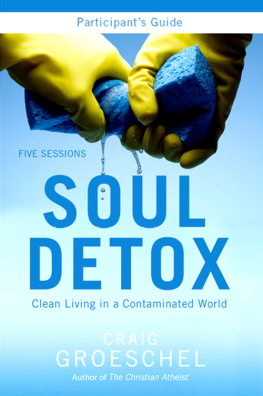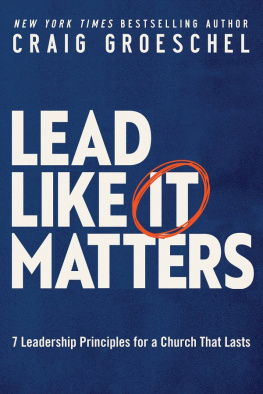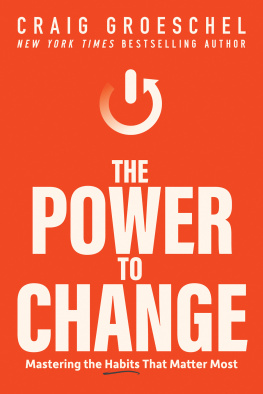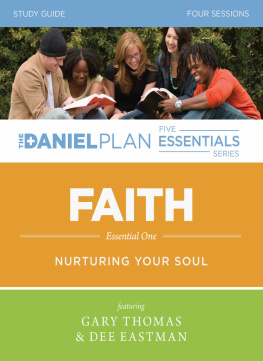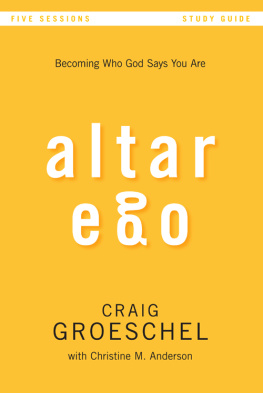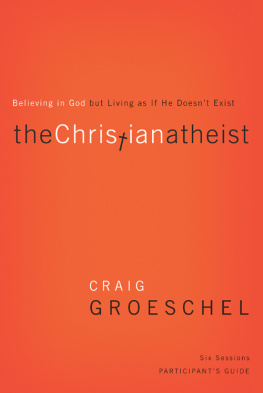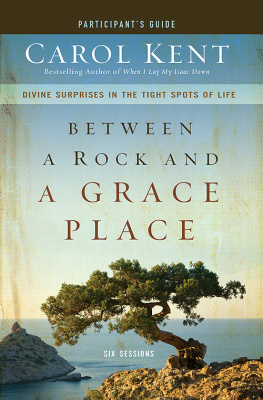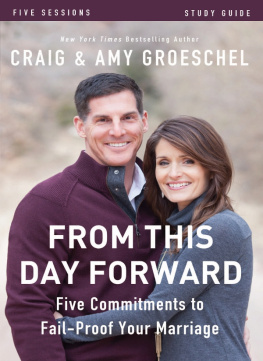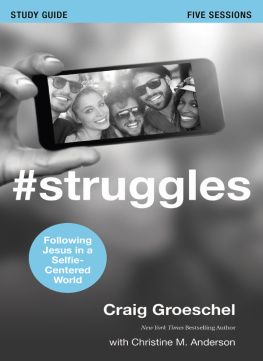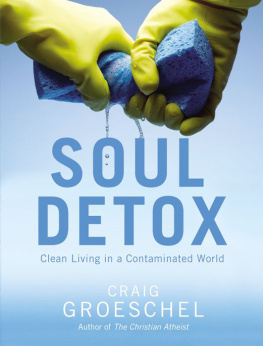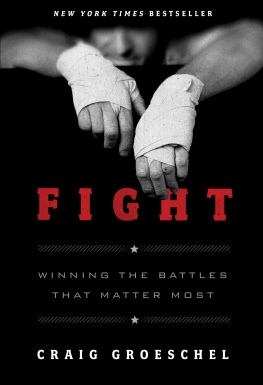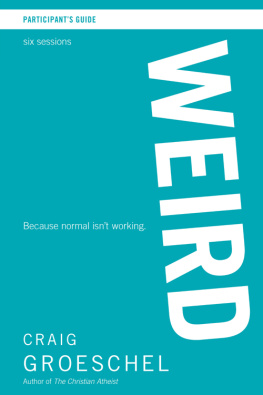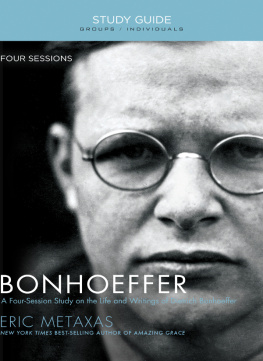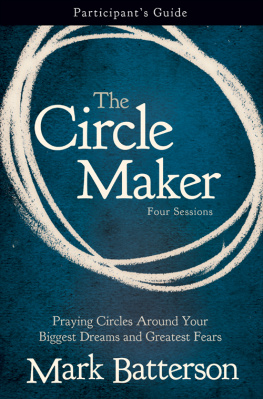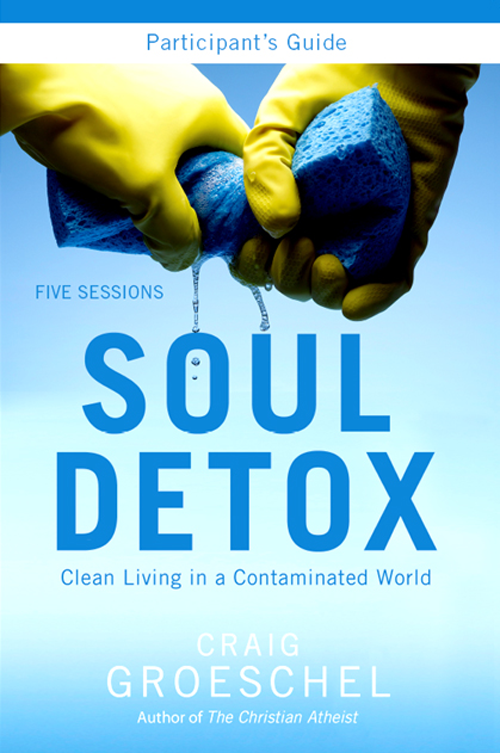Each participant should have his or her own Participants Guide, which includes video outline notes, directions for activities and discussion questions, as well as personal studies to deepen learning between sessions.
Adhering to the suggested times will enable you to complete each session in one hour. If you have a longer meeting, you may wish to allow more time for discussion and activities. You may also opt to devote two meetings rather than one to each session. In addition to allowing discussions to be more spacious, this has the added advantage of allowing group members to read related chapters in the Soul Detox book and to complete the personal study between meetings. In the second meeting, devote the time allotted for watching the video to discussing group members insights and questions from their reading and personal study.
Each group should appoint a facilitator who is responsible for starting the video and for keeping track of time during discussions and activities. Facilitators may also read questions aloud and monitor discussions, prompting participants to respond and assuring that everyone has the opportunity to participate.
Maximize the impact of the curriculum with additional study between group sessions. Every personal study includes reflection questions, Bible study, and a guided prayer activity. Youll get the most out of the curriculum by setting aside about one hour between sessions for personal study. For each session, you may wish to complete the personal study all in one sitting or to spread it out over a few days.
In this ebook edition, please use your devices note-taking function to record your thoughts wherever you see the bracketed instructions [Your Notes] or [Your Response]. Use your devices highlighting function whenever you are asked to checkmark, circle, underline, or otherwise indicate your answer(s).
The tongue is a thermometer; it gives us our spiritual temperature. It is also a thermostat; it regulates our spiritual temperature. Control of the tongue can mean everything.
R ICHARD J. F OSTER , C ELEBRATION OF D ISCIPLINE
Welcome
Welcome to Session 1 of Soul Detox. If this is your first time together as a group, take a moment to introduce yourselves to each other before watching the video. Then lets get started!
Video:Lethal Language (12 Minutes)
Play the video segment for Session 1. As you watch, use the outline below to follow along or to take notes on anything that stands out to you.
Notes
The tongue has the power of life and death (Proverbs 18:21a).
[Your Notes]
The Bible contrasts life-giving words and toxic words:
Reckless words pierce like a sword, but the tongue of the wise brings healing (Proverbs 12:18 NIV 1984).
The tongue that brings healing is a tree of life, but a deceitful tongue crushes the spirit (Proverbs 15:4 NIV 1984).
We must guard our hearts against toxic words (see Proverbs 4:23).
[Your Notes]
Truth vs. trash: When people speak words about you, is what they say true? If so, believe it and embrace it. If its trash, reject it.
[Your Notes]
Every chance you get, speak life-giving words.
Do not let any unwholesome talk come out of your mouths, but only what is helpful for building others up (Ephesians 4:29a).
[Your Notes]
Any time you think something positive, say it. Why rob someone of a blessing by keeping a positive statement to yourself?
[Your Notes]
Dont internalize the toxic words that others speak about you. Guard your heart.
[Your Notes]
Group Discussion (46 Minutes)
Take a few minutes to talk about what you just watched.
1. What part of the teaching had the most impact on you?
[Your Response]
Toxic Words
2. A toxic substance is something that causes serious harm or even death. Toxikon, the Greek origin of the English word toxic, refers to an archers bow armed with a poison arrow. The psalmist uses this very image to describe the power of toxic words:
[Evildoers] sharpen their tongues like swords and aim cruel words like deadly arrows (Psalm 64:3).
The author of Proverbs draws on a similar image:
The words of the reckless pierce like swords (Proverbs 12:18a).
Those who speak toxic words in these verses are evildoers and the reckless. How would you describe the similarities and differences in how words are used by someone who is an evildoer and someone who is reckless? If you can think of any, use examples from the news, social media, books, movies, etc. to describe both.
[Your Response]
Overall, how would you characterize the people whose words have wounded you? As evildoers, as reckless, or as something else?
[Your Response]
At some point in our lives, all of us have spoken words that wound. What thoughts or feelings are you aware of when you consider how the words evildoer and reckless might characterize you?
[Your Response]
Guard Your Heart
3. Toxic words are words that lodge in the heart and cause deep wounds. When we internalize these words, we allow them to distort the truth about who we are and that impacts everything. The Bibles familiar wisdom about this comes from Proverbs:
Above all else, guard your heart, for everything you do flows from it (Proverbs 4:23).
everything we might describe as psychological, spiritual, intellectual, and emotional. To guard your heart, then, is to guard the essence of who God created you to be.
What examples come to mind when you think of what it means in practical terms to guard your heart? How have you done this well, or how have you witnessed someone you know doing this well?
[Your Response]
How would you describe the differences between guarding your heart and being overly self-protective in your relationships?
[Your Response]
4. The verses that follow Proverbs 4:23 elaborate on it by listing specific behaviors that guard the heart:
Keep your mouth free of perversity; keep corrupt talk far from your lips. Let your eyes look straight ahead; fix your gaze directly before you. Give careful thought to the paths for your feet and be steadfast in all your ways. Do not turn to the right or the left; keep your foot from evil (Proverbs 4:24 27).

